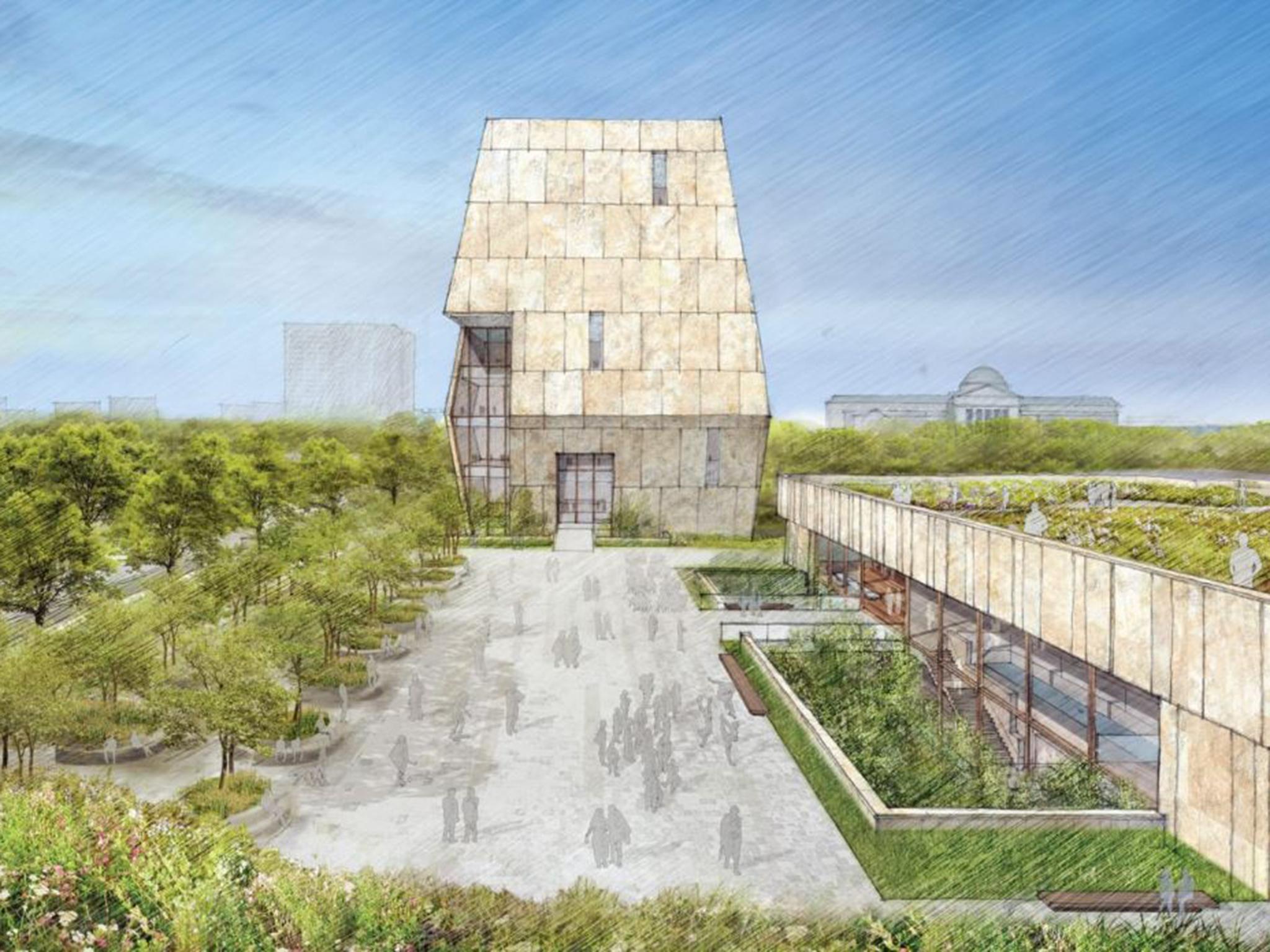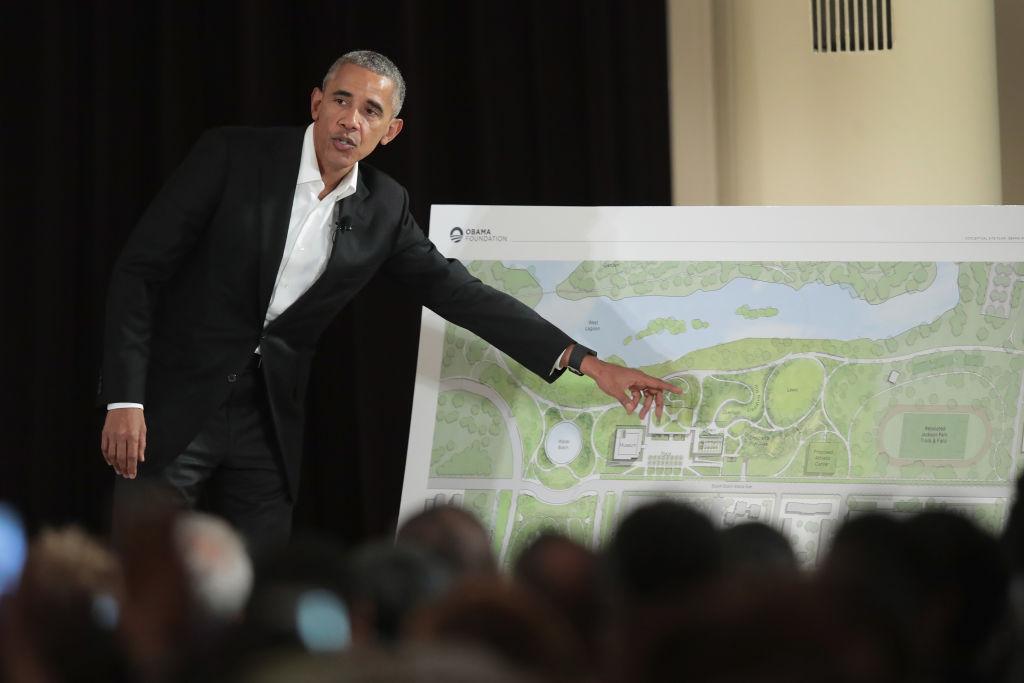Barack Obama is building a library – and grappling again with Chicago politics
A man who started off in in community organising is getting an earful – from the city’s community organisers

Your support helps us to tell the story
From reproductive rights to climate change to Big Tech, The Independent is on the ground when the story is developing. Whether it's investigating the financials of Elon Musk's pro-Trump PAC or producing our latest documentary, 'The A Word', which shines a light on the American women fighting for reproductive rights, we know how important it is to parse out the facts from the messaging.
At such a critical moment in US history, we need reporters on the ground. Your donation allows us to keep sending journalists to speak to both sides of the story.
The Independent is trusted by Americans across the entire political spectrum. And unlike many other quality news outlets, we choose not to lock Americans out of our reporting and analysis with paywalls. We believe quality journalism should be available to everyone, paid for by those who can afford it.
Your support makes all the difference.When the Barack Obama Presidential Centre opens in 2021, it will sprawl across 20 acres of this city’s densely packed South Side. A museum will occupy one tower-like building; another, dubbed “The Forum”, will house a test kitchen, recording studio and auditorium. The library itself won’t literally house Obama’s papers, since the plan is to digitise everything, but it will feature a rooftop park to complement its community garden, sledding hill and playground.
The 44th President says he wants it to serve not as a monument to himself but to bigger ideals – democracy, citizenship and civic engagement. Still, Chicago Sun-Times columnist Lynn Sweet spoke for many when she predicted that the complex will one day be known around here as “Obamaland”.
For now, as Obama is busily raising the hundreds of millions needed to construct and endow it, ahead of the planned groundbreaking ceremony next year, he is once again navigating tensions and attempting to finesse the politics of the town where he started out.
Building on public land in a city is always a messy endeavour, and the excitement and pride the city holds for the Obamas is tinged with concern.
Earlier this month, the former President stopped by the Gary Comer Youth Center, to make a surprise visit to a training class his foundation held for local activists. Its director, Ayoka Mota Samuels is a fan and booster, but she has heard the grumbling from some of the neighbours about the prospect of having a massive tourist attraction in their midst.
How will traffic be mitigated? Is the plan to replace the park land where the centre is being built sufficient? Who is going to get the construction jobs?
“It wouldn’t be Chicago if we didn’t have complaints about everything ... People are definitely excited about the library, without a doubt, but they are concerned about ‘how does it impact me?’” she says. “Chicagoans are like that about everything. It means that we care about what’s going to happen in our neighbourhood.”

In what local pundits are calling the irony of ironies, Obama – who cut his teeth as a South Side community organiser – is now in the bull’s eye of the area’s community organisers.
Dozens of groups have asked the city, the Obama Foundation and the University of Chicago (the official library host) to sign a legally binding pledge to protect low-income housing and homeowners, set aside 80 per cent of jobs for immediate neighbours and bolster support for black-owned businesses, among other things.
At a community meeting last month, Obama said he wasn’t interested, according to the Chicago Tribune. Agreements such as those, he said, can be highly successful for communities dealing with for-profit developers.
“But here’s the thing,” he said. “We are a non-profit and aren’t making money. We are just bringing money to the community.”
Obama’s deep connections to his adopted hometown were on display last week during the first summit of his new foundation. His mother-in-law, a Chicago native, sat in the audience, and the city’s role in his life story was a constant refrain.
“I arrived here, and for the next three years, I travelled all through the South Side and worked with leaders in churches and block clubs and community organisations,” he said during the opening session. His own successes were modest, he said, but he learned that “ordinary people in local communities can do extraordinary things when they’re given a chance, when their voices are heard”.
Michelle Obama reminisced about life in a neighbourhood packed full of her extended family.
“We lived in a house above my maternal aunt,” she said. “We lived around the corner from my grandmother and another aunt. My grandfather, my mother’s father, and his wife were separated, never divorced but living right around the corner from each other. That’s black Chicago for you. It’s functional dysfunction.”
Still, there’s no indication they plan to move back. The Obamas recently purchased a home in Washington, where their daughter Sasha is still in high school, and the New York Post claims that the couple is shopping for an apartment in the city’s Upper East Side.
The couple considered sites in Hawaii and New York for the presidential museum and library before settling on Chicago. The plan quickly drew a backlash from preservationists devoted to Jackson Park, which was designed in 1871 by Frederick Law Olmsted, the legendary landscape architect of Central Park fame.
The not-for-profit group Friends of the Parks initially pushed for the centre to be built instead on vacant land across the street from a different Chicago park. Executive director Juanita Irizarry acknowledges that their case can’t prevail legally, so instead, “we want to make sure the least damage to the park takes place and that we get green space back elsewhere in the community to make up for the green space amenities taken up by the library”. She is pleased that the foundation now seems to be rethinking a plan to build an above-ground car park on the site, which she said would be a “further encroachment on the local green space”.
And while rejecting calls to sign the “community benefits agreement” pushed for by activists, the foundation has been making good on that front. Mike Strautmanis, the foundation’s vice-president of civic engagement, says the real problem with the contract is that “it’s not inclusive enough” and that Barack Obama wants to see more aggressive steps taken to launch South Siders into lasting careers.
Some activists remain unconvinced, and they are leaning on the city to sign the binding contract they want. “The sort of musical-chairs game that is at play with low-income and working families across the city has to stop,” says Jawanza Malone, executive director of the Kenwood-Oakland Community Organisation, which in 2015 organised a hunger strike to get a neighbourhood school reopened.
He still wants to see the centre built, though. “This effort is not anti-Barack Obama,” he says. “It is not anti-Obama presidential centre.”
Obama may be facing more contention about the construction of his library than most former presidents. But others have typically tucked theirs into sprawling suburbs or university campuses. Obama is intent on building his in the city, playing on the flow of an urban community and focusing on the power of community organising as a central principle.
“It’s very much of and part and by Chicago while also being something that pretty much anyone in the world can participate in,” says Glenn Otis Brown, chief digital officer at the Obama Foundation.
Last week, Obama brought the world to Chicago – in the person of celebrities such as Prince Harry and Lin-Manuel Miranda, who participated in the summit. But he made a point of celebrating the city, with Grammy-winning native son Chance the Rapper performing at a free community concert.
This “is the project that I will be spending the next 20 years, 30 years, 40 years on,” Obama told the crowd. “It will be a labour of love that we are going to build together.”
Mariana Alfaro and Hannah Wiley contributed to this report
© Washington Post
Join our commenting forum
Join thought-provoking conversations, follow other Independent readers and see their replies
Comments